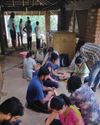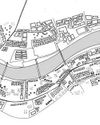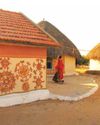Versuchen GOLD - Frei
Building Resilience: Intent, Parameters And Agendas
Indian Architect & Builder
|April 2018
Amit Prothi is Associate Director at 100ResilientCities, a program of the Rockefeller Foundation. He is working with cities in Asia including Singapore, Seoul, Melaka, Chennai, Surat, Da Nang and Can Tho to promote urban resilience. Amit has practiced in North America, Asia and Africa for the World Bank, Asian Development Bank, Rockefeller Foundation, US Government, and numerous municipalities and private sector clients. For nearly 20 years, he has worked on thematic areas including environmental planning, urban policy, urban design, land use planning, natural resource management, flood management, disaster risk reduction, housing, and community development.

Cities encompass a substantial ratio of world population. Cities offer jobs, housing, opportunities and inevitably it is cities that contribute a large chunk (approximately 3/4 th quarter) to the global Gross Domestic Product (GDP). Cities showcase three persistent trends – rapid urbanisation, globalisation and climate change. Rapid urbanisation and globalisation are interconnected processes while climate change is a consequence of many factors, of which the aforementioned play a major role. The world is urbanizing at a rapid pace. From 10% in 1800 AD to 54% in 2017 to 75% in 2050; urbanisation will impact the world substantially. And 75% of the infrastructure that the world will consume in 2050 is un-built. Given the substantial potential and prospect that the future holds, the time to build resilience in current cities and to design cities of the future, is the present age.
The Rockefeller Foundation wrestled with the notion of future cities and subsequent infrastructure. 100 Resilient Cities (100RC) was established to deliberate upon the same - 100 cities across the globe wherein cities avail resources and strategies to build resilience. Resilience is the capacity of individuals, communities, institutions, businesses and systems within a city to survive, adapt and grow; irrespective of chronic stresses and acute shocks they experience. The initiative works with cities and offers them 4 resources – A Chief Resilience Officer (CRO) sponsored by the Rockefeller Foundation for two years. The CRO advocates and convenes resilience and is the point person on the matter.

Diese Geschichte stammt aus der April 2018-Ausgabe von Indian Architect & Builder.
Abonnieren Sie Magzter GOLD, um auf Tausende kuratierter Premium-Geschichten und über 9.000 Zeitschriften und Zeitungen zuzugreifen.
Sie sind bereits Abonnent? Anmelden
WEITERE GESCHICHTEN VON Indian Architect & Builder

Indian Architect & Builder
Interlacing Perspectives
‘Meraki-2019’ A visionary Seminar series presented by Dr.Baliram Hiray College of Architecture, Bandra(East), Mumbai.
3 mins
November 2019

Indian Architect & Builder
Facilitating A Community Through Architectural Practice
The humble, self-designed, self-built and organically planned home built by the majority of the world population rarely gets appreciated and critiqued as a viable lesson in architectural design.
5 mins
November 2019

Indian Architect & Builder
The Art Of Solving Problems Creatively
The practice of architecture is perhaps incomplete without the complement of a variety of other arts.
3 mins
November 2019

Indian Architect & Builder
Upcycling towards a playful tomorrow
Play is like the middle child, often forgotten, and always taking a back seat. For young kids, play can simply be running around, armwrestling with friends, building sandcastles on the beach, or singing popular music tracks in the shower.
3 mins
November 2019

Indian Architect & Builder
Balancing The Poetics And Pragmatism Of Everyday Design
Humanity is faced with an oxymoronic crisis. The crisis involves the earth, the environment, impending looms of climate change, deforestation, loss of species, dwindling resources etc.
3 mins
November 2019

Indian Architect & Builder
Just Give Me Some Space: Discussions And Beyond
Just Give Me Some Space (JGMSS) is Suha Riyaz Khopatkar’s debut book that paints a portrait of the dynamic life of an architecture student.
17 mins
November 2019

Indian Architect & Builder
The Next In Vernacular Architecture
Architecture has become a capitalist.
5 mins
IAB October 2019

Indian Architect & Builder
Rethinking The Future: Architecture And Its Education
“I want to be like animals, the bird makes a nest in one or two days, the rat digs a hole in a night, but intelligent humans like us spend 30 years to have a house, that’s wrong.” - Jon Jandai
10 mins
IAB October 2019

Indian Architect & Builder
Uniting The Human-Scale With The City-Scale
London-based architect Usman Haque is famed for his interactive architectural systems, and for his exploration of newer, more effective ways of creating human engagement and interaction through his designs. Indian Architect & Builder caught up with him, to quiz him on a variety of topics such as his journey as an architect, his inspirations and philosophies, architects using the digital revolution to their advantage, and more!
6 mins
IAB October 2019

Indian Architect & Builder
Framing spaces
Almost every architect also doubles as a photographer or at least an enthusiast.
5 mins
IAB October 2019
Translate
Change font size

